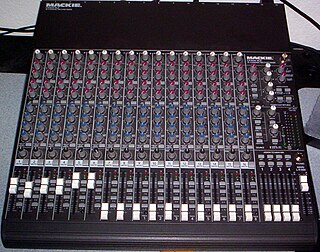Related Research Articles

The 1604-VLZ Pro is a compact analog mixer manufactured by professional audio equipment brand Mackie. It features sixteen input channels, four output sub-groups, and a user-replaceable fuse. Each of the input channels features a high-quality microphone preamplifier.

Behringer is an audio equipment company founded by the Swiss engineer Uli Behringer on 25 January 1989 in Willich, Germany. Behringer produces equipment including synthesizers, mixers, audio interfaces and amplifiers. Behringer is owned by Music Tribe, a holding company chaired by Uli Behringer.
Solid State Logic (SSL) is a British company based in Begbroke, Oxfordshire, England that designs and markets audio mixing consoles, signal processors, and other audio technologies for the post-production, video production, broadcast, sound reinforcement and music recording industries. SSL employs over 160 people worldwide and has regional offices in Los Angeles, Milan, New York City, Paris, and Tokyo, with additional support provided by an international network of distributors. Solid State Logic is part of the Audiotonix Group.

Mackie is an American professional audio products brand. Founded in Seattle in 1988 by Greg Mackie, a manufacturer of affordable and versatile compact pro audio mixers, Mackie is the primary product line of LOUD Technologies.
Midas is a company that designs professional audio consoles. Founded in London in 1970 by Jeff Byers and Charles Brooke, today the company is part of the Music Tribe group of brands.
Electro-Voice (EV) is an American manufacturer of audio equipment, including microphones, amplifiers, and loudspeakers, focused on pro audio applications such as sound reinforcement and commercial and residential audiovisual installations. As a subdivision of Bosch Communications Systems Inc. since 2006, Electro-Voice markets products for use by consumers as well as small or large concert venues, broadcasting, houses of worship, and in retail situations.
Eastern Acoustic Works (EAW) is an American manufacturer of professional audio reinforcement tools, such as loudspeaker systems and processors. From 1978 to 1988 it was located at 59 Fountain Street in Framingham, Massachusetts, and subsequently One Main Street in Whitinsville, Massachusetts. It is now headquartered at 19 National Drive in Franklin, Massachusetts.
Harrison Audio Consoles is an international company based in Nashville, Tennessee that manufactures high-end mixing consoles, Digital Audio Workstations (DAW), audio plugins, and other audio technologies for the post-production, video production, broadcast, sound reinforcement and music recording industries. The company is renowned as an industry innovation for its "in-line" mixing console design that has subsequently become the standard for nearly every large-format music console. Over 1,500 Harrison consoles have been installed worldwide, presenting a significant percentage of the overall world market share for high-end audio consoles. The company founder, Dave Harrison, was inducted as a Fellow in the Audio Engineering Society for this technical contribution of the recording industry and in particular the first 32-bus "in-line" console.

Waveform, previously known as Tracktion, is a digital audio workstation for recording and editing audio and MIDI. The software is cross-platform, and runs on Apple macOS, Microsoft Windows, and Linux.
LOUD Audio, LLC is a professional audio company based in the United States, operating in the U.S., Canada, and Shenzhen, China. Originally founded as Mackie Designs, Inc., the name was changed to Loud Technologies Inc in 2003 to differentiate its founding subsidiary, mixing console manufacturer Mackie from its eponymous brand name.

Arthur Rupert Neve was a British-American electronics engineer and entrepreneur, who was a pioneering designer of professional audio recording equipment. He designed analog recording and audio mixing equipment that was sought after by professional musicians and recording technicians. Some of his customers were music groups The Beatles, Aerosmith and Nirvana, and recording studios Sound City Studios and Abbey Road Studios. Companies that he was associated with included Neve Electronics, Focusrite, AMS Neve, and Rupert Neve Designs.

Yamaha Pro Audio, Inc. is the Pro Audio Division division of Yamaha Corporation that offers a complete line of beginner professional audio products for the live sound and sound reinforcement markets. Their lineup includes a number of world-standard mixing consoles, signal processors incorporating industry-leading DSP technology, power amplifiers based on energy-efficient drive technology, and an extensive range of speakers used for live sound or commercial installations. It has a long history of introducing significant products for the professional audio market such as the PM-1000 modular mixing console, the REV1 and SPX90 digital signal processors, the NS-10 studio monitors, and the 01v, 02R, 03D, PM1D, PM5D, QL5, M7CL, CL5, and PM10/7 Rivage digital mixing consoles.
DiGiCo is a British company based in Chessington, England that designs, markets, and manufactures digital mixing consoles and other audio technologies for the live sound, musical theatre, broadcast, and installed sound markets. Originally founded from console manufacturer Soundtracs, DiGiCo is part of the Audiotonix Group.
The Soundscape R.Ed (1997–2001) was the second generation digital audio workstation manufactured by Soundscape Digital Technology Ltd. It was renamed the Soundscape 32 after Mackie acquired the product and continued to be available until around 2007.

An automixer, or automatic microphone mixer, is a live sound mixing device that automatically reduces the strength of a microphone's audio signal when it is not being used.
Philip Stephen Dudderidge is a British sound engineering entrepreneur. He is a notable figure in the professional audio industry, having worked as Led Zeppelin's concert sound mixer, and later co-founding Soundcraft Electronics Ltd before serving as Chairman of Focusrite Audio Engineering Ltd.

Bruce Robert Jackson was an Australian audio engineer who co-founded JANDS, an Australian audio, lighting and staging company. He joined American touring audio engineer Roy Clair and mixed concert stage monitors for Elvis Presley in the 1970s. With Clair Brothers, a concert sound company, Jackson designed audio electronics including a custom mixing console. Beginning in 1978, Jackson toured as Bruce Springsteen's band engineer for a decade, using Clair Brothers sound systems. A business interest in Fairlight CMI in Sydney introduced Jackson to digital audio, and he subsequently founded the digital audio company Apogee Electronics in Santa Monica, California, where he lived at the time. After selling his share of Apogee, Jackson co-founded with Roy and Gene Clair a joint venture which produced the Clair iO, a loudspeaker management system for control of complex concert sound systems. Jackson turned the venture commercial with the help of Dave McGrath's Lake Technology. Dolby Laboratories bought the technology and formed Dolby Lake with Jackson as vice president, then in 2009 Lab.gruppen acquired the brand. Jackson was honoured with the Parnelli Innovator Award in 2005 for his inventive loudspeaker controller.
Peter Watts is a designer of pro audio equipment who is recognized as a leader in his field.

RCF S.p.A. is a widely recognized Italian manufacturer of high performance audio products including power amplifiers, loudspeakers, digital mixers and digital signal processors (DSP).
Paul Wolff is an American electronics engineer and entrepreneur, who is a designer of professional audio recording equipment. He designs recording consoles including immersive and audio mixing equipment for professional recording. He has been associated with companies including Datatronix, API, Tonelux, and Fix Audio Designs. His customers include Jim Messina, Jimmy Jam and Terry Lewis, and Startec Studios, among others.
References
- ↑ "Clair L. Mackie Obituary". South Whidbey Record. 22 December 2007. Retrieved 2 January 2019.
- ↑ "Mackie at AMS". American Musical Supply. Retrieved 2017-06-05.
- 1 2 "AES PNW Section Meeting - An Evening with Greg Mackie". 2003-07-19. Archived from the original on 2003-07-19. Retrieved 2020-11-23.
- 1 2 "Answers - the Most Trusted Place for Answering Life's Questions". Answers.com .
- 1 2 3 4 5 "History of Mackie Designs Inc. – FundingUniverse".
- 1 2 "1990 Mackie CR-1604 Mixer". Archived from the original on 2014-05-05. Retrieved 2014-02-09.
- ↑ Steve Wilhelm, "Mackie Founder Sells at a Discount", Puget Sound Business Journal, Jan 2003
- ↑ "Woodinville audio maker Mackie Designs cutting back | the Seattle Times".
- ↑ "Mackie Designs Inc Now Loud Technologies" Archived 2011-06-29 at the Wayback Machine , Mix Magazine, Sep 2003
- ↑ "QSC Joins Forces with M&W; Pro Audio, LTD. - Total Production". Archived from the original on 2011-10-05. Retrieved 2011-08-22.
- ↑ "QSC, M&W Pro Audio Announce Partnership", Mix Magazine, Sep 2010
- ↑ "KORG Teams up with Greg Mackie and Peter Watts". Gear Space.
- ↑ "Why Did Korg Partner with Greg Mackie and Peter Watts to Enter the Pro Audio Mixer Market?". Church Production. 7 November 2021.
- ↑ "Greg Mackie To Receive Parnelli Audio Innovator Honor at Oct. 22 Awards Ceremony". Front Of House Online. Front Of House Magazine. 24 May 2016. Retrieved 3 January 2019.
- ↑ "EY Entrepreneur Of The Year Hall of Fame". EY Entrepreneur Of The Year. Ernst & Young. Archived from the original on 14 June 2006. Retrieved 3 January 2019.